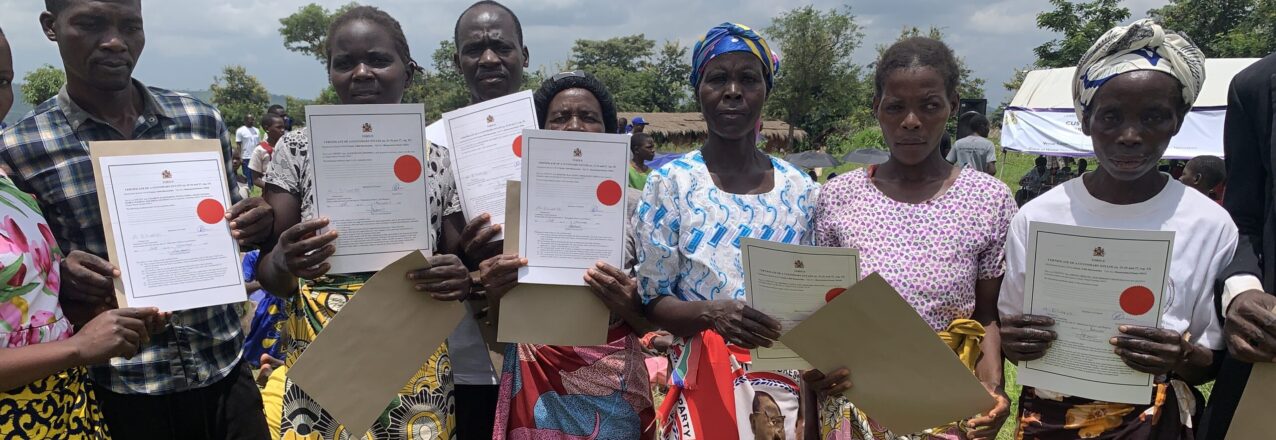Under the Integrated Land and Resource Governance (ILRG) program, a five-year global mechanism (2018-2023), USAID worked with the Government of Malawi to carry out a gender-responsive customary land documentation process in Traditional Land Management Area (TLMA) Mwansambo. Seventy percent of the population in Malawi, most of whom are smallholder farmers, live on customary land held by communities and administered by community leaders. Less than 10 percent have some form of land documentation. ILRG documented an entire TLMA in a year as a proof of concept to help inform the Government of Malawi’s national roll-out of a customary land documentation process across jurisdictions. While other donors have supported other land documentation pilot projects in Malawi in recent years, ILRG was the first to take a systematic gender lens to the work. Resources produced under the activity include manuals and facilitation guides for gender norms and social inclusion training for various stakeholders, reflections on the gender integration process, and lessons for the Government of Malawi on how to make future land documentation processes more cost-effective and efficient.
Manuals and Implementation Resources:
- Gender and Land in Traditional Land Management Area (TLMA) Mwansambo in Malawi: Gender Assessment (Brief, Report): Gender assessment to understand the barriers and opportunities to promote gender equality in land registration and to inform the design of the gender-responsive land documentation activity.
- ILRG Malawi Implementation Plan: Implementation plan for ILRG gender-responsive land documentation activity in Malawi.
- Practical Implementation Guide on Gender Equality and Social Inclusion in Customary Land Registration in Malawi: Practical resource on how to promote gender equality and social inclusion in customary land documentation processes. The target audience for the guide is all stakeholders directly involved in customary land documentation, including government officers, traditional leaders, and international organizations and donors. The document provides a series of short practical technical guidance on gender equality and social inclusion for each specific step of the process, from planning to land certificate distribution.
- Women’s Empowerment and Leadership Training Manual for Women in Customary Land Committees in Malawi: Facilitation manual to deliver participatory training for women in leadership positions in land governance structures. The curriculum focuses on technical and socio-emotional skills to enable women to effectively and meaningfully exercise their leadership role.
- Training Manual for Household Dialogues on Gender Norms in the Context of Land Rights in Malawi: Manual dialogues to facilitate dialogues on harmful gender norms at the household level, where most decisions about ownership, access, control, and disposal (including inheritance) of land are made. The curriculum focuses on harmful norms related to access to resources, gendered division of labor, gendered decision-making, and gender-based violence.
- Simplified Training on Gender Norms Dialogue Sessions for Customary Land Committee Members in Malawi: Manual to facilitate light-touch dialogues on harmful gender norms with women and men elected to land governance structures.
- Gender Norms Dialogue for Traditional Leaders in Malawi Training Manual: Manual to facilitate a three-part dialogue process with traditional leaders so they can identify harmful norms that hinder women’s land rights and devise their own solutions to start shifting these norms.
Final Reports and Lessons Learned Resources:
- Supporting Gender Integration in Customary Land Documentation in Malawi: Factsheet on ILRG activity in Malawi.
- ILRG Malawi Final Report: Reflections from Customary Land Documentation Scaling Project: Summary of experiences from the land documentation work in Malawi, focusing on overall process lessons and recommendations.
- Lessons Learned: Integrating Gender Equality and Social Inclusion into Customary Land Documentation in Malawi: Summary of 10 lessons from integrating gender equality and social inclusion into the customary land documentation process, highlighting key results, challenges, and recommendations.


